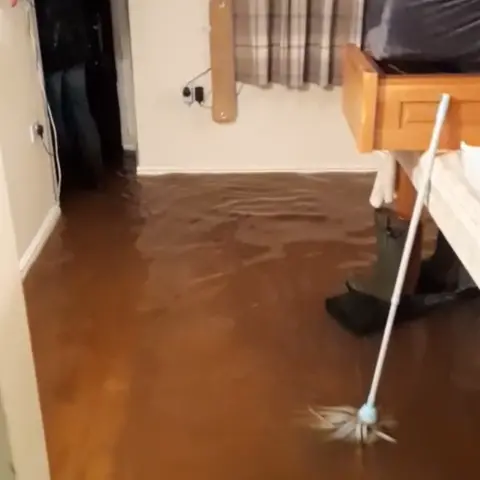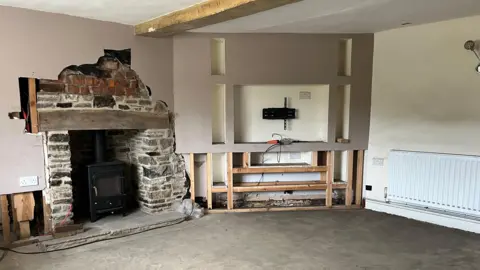Farmer refuses to pay council tax on flooded house
A dairy farmer says he and his family are refusing to pay council tax on their home which was badly damaged by floodwater in October.
Paul Woosnam said they were unable to live in what was little more than a "building site" while waiting for insurance to cover repairs - and should not be liable for the levy while also paying tax on a temporary home into which they had had to move.
He said that despite the circumstances, an application for dispensation over the flood-hit home had been rejected by Shropshire Council.
A spokesperson for the authority said its tax officers would be "happy to discuss the situation with Mr Woosnam".
The ground floor of the farmhouse, on a dairy farm site near Bishop's Castle in south Shropshire, was completely flooded after days of heavy rain last autumn.
An estimated seven inches (18cm) of water inside the home was "contaminated" by nearby cow sheds and septic tanks, leaving behind a layer of sludge, Mr Woosnam said.
"It was a mess," the father-of-four told the BBC.
 Paul Woosnam
Paul WoosnamNine months on, he is still waiting for insurance pay-outs so the house can be repaired.
"We're still not allowed to come back in, it's a building site really," he said, adding that "it's not good for young children - there's nails and stuff all over the floor".
The farmer noted that "big [insurance] claims" like his could take a long time to come through, delaying the start of repair work.
He said tax issues had emerged when, after the flood, he, his wife, and their children moved to another house - with council tax being paid on that privately-rented property.
But Mr Woosnam and his father, who owns the flood-damaged house, received a council tax bill for the vacated home.
A discretionary council tax discount, known as a Section 13A, was then applied for, Mr Woosnam said.
Such discounts come under the Local Government Finance Act 1992, which, according to Shropshire Council, "provides billing authorities with the discretion to award a council tax discount outside of the statutory discounts and exemptions".
But Mr Woosnam said his case had been rejected as he was still accessing the site on which the blighted home stood to get to the dairy farm there.
"That didn't go down too well," he said.

Mr Woosnam said that at one point, the council had designated the flood-damaged house a second home because of the temporary accommodation, initially charging a 100% council tax premium as a result, although it had since appeared to cease that pursuit.
"They've said it's a holiday home - it's not a holiday home, it's a building site that we're not even allowed [to live] in," he said.
The council has since sent Mr Woosnam letters threatening legal action if he does not pay council tax on the damaged home.
"We've got no kitchen, no cookers, no washing facilities at all, so it's just not advisable for us to be in [there]," he said.
"It's a derelict house as far as I'm concerned - we can't live here, so why should we have to pay council tax on it?"
A spokesperson for Shropshire Council stated: "Our records show that council tax for the property has been due since October 2024, when the property became empty."
They added that council tax officers would "contact Mr Woosnam to discuss the situation".
Follow BBC Shropshire on BBC Sounds, Facebook, X and Instagram.
